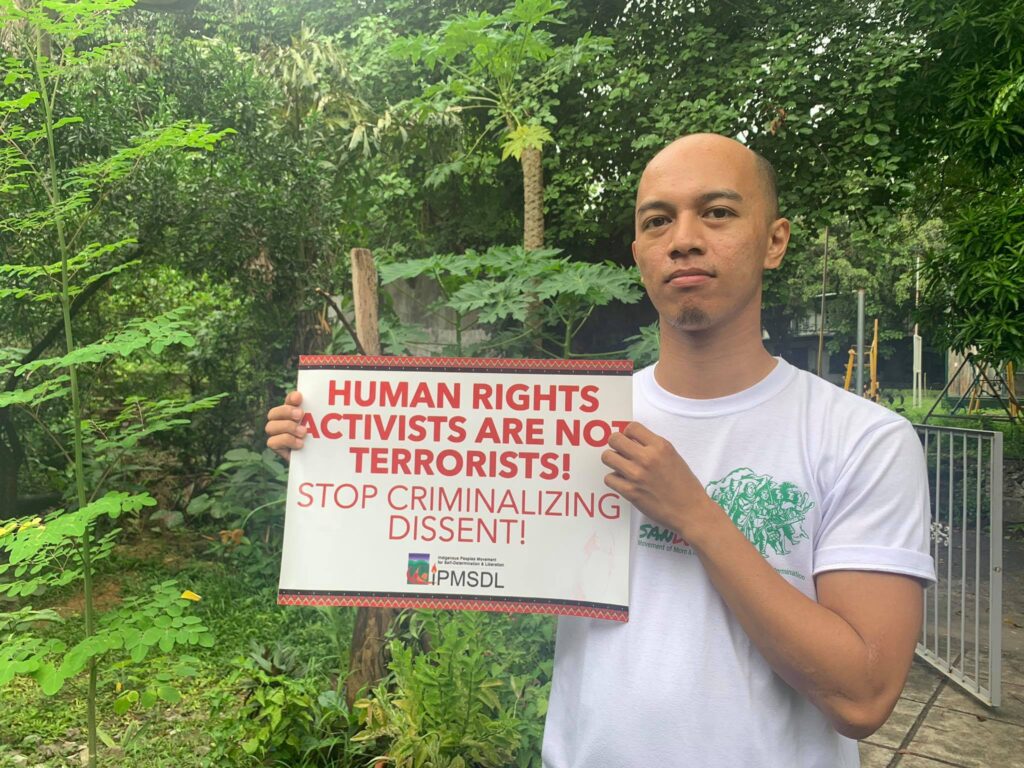
The IPMSDL was established as an international network of indigenous peoples’ organizations and advocates in 2010 here in the Philippines.
“I am the communications officer of the global secretariat; I entered the team in 2017. We talk about our work and advocacy campaigns via social media and other platforms. I also reach out for linkages with other advocates and organisations in different countries.”
“It’s a very challenging climate here in the Philippines right now. Our president [Rodrigo Duterte] has been very vocal in his stance against human rights and human rights defenders, and his policies on dealing with critics in civil society and other multilateral agencies. The recent UN OHCHR report [June 2020] about the Philippines reflects a lot about what is happening to human rights defenders here: a lot of issues of criminalisation, killings and harassment, but perhaps the biggest thing is how human rights defenders are being ‘terrorist-tagged’ or ‘red-tagged’ as it is called here. It’s an official government agenda: the national taskforce for ending insurgency works not only with the military on security issues but also holds seminars in schools, local government, the social welfare ministry. In these seminars they publicly name progressive civil society organisations, NGOs and indigenous rights defenders as fronts or supporters of the insurgencies. Indigenous leaders and organisations are maligned and vilified by very active state-sponsored propaganda. The government has been lobbying in the USA, Europe, the UN for countries to not give financial support to them. That really hurts our work and endangers our leaders and their families because the Philippines needs the help and support of those countries. On top of that there is a new anti-terrorism bill that basically will be the last nail in the coffin of human rights defenders because it will put into law what we already fear and what is already happening.”
“In the past, the Philippines government was actually praised by other countries because in 1997 they adopted the Indigenous Peoples’ Rights Act, which is very progressive. It’s a good piece of legislation. But, of course, what’s written on paper sometimes doesn’t really translate to implementation, how it is handled on the ground. Its adoption by the local government is very problematic.”
“I attended DTP training in 2018 in Timor-Leste. It was my first time attending an international training program. DTP explains the available mechanisms and routes for upholding human rights at a community/national level through workshops on UN mechanisms and other international and regional platforms. I wasn’t really familiar with those kinds of things and that’s where I learned a lot. The speakers were very helpful, because they were people who actually had direct experience in how those kind of things work.”
“IPMSDL is a multilateral platform engaging with governments and other development groups. As we are based in Manila we have particularly active networks in Asia. Because of DTP I was able to broaden my contacts in Asia more, making friends with a lot of human rights defenders in Bangladesh, India, Sri Lanka, and so on, so I would say that really helped our work a lot.”
“If you want to help you could write to your government expressing a concern with the human rights situation in the Philippines and with threats to human rights defenders. Encourage adoption of the OHCHR report on human rights in the Philippines and support an independent investigation into the human rights situation. Of course, you can also link up with us: IPMSDL and our national partners. There are lots of avenues to help online through campaigns [e.g. Katribu Philippines; Karapatan Alliance;Amnesty International], statements, videos, and distributing educational material referencing the challenges facing indigenous peoples here.”
DTP acknowledges the traditional custodians of the land on which we work, the Bedegal people of the Eora Nation. We recognise their lands were never ceded, and we acknowledge their struggles for recognition and rights and pay our respects to the Elders – past, present – and the youth who are working towards a brighter tomorrow. This continent always was and always will be Aboriginal land.
Aboriginal and Torres Strait Islander peoples should be aware that this website contains images or names of people who have passed away.
DTP acknowledges the traditional custodians of the land on which we work, the Bedegal people of the Eora Nation. We recognise their lands were never ceded, and we acknowledge their struggles for recognition and rights and pay our respects to the Elders – past, present – and the youth who are working towards a brighter tomorrow. This continent always was and always will be Aboriginal land.
Aboriginal and Torres Strait Islander peoples should be aware that this website contains images or names of people who have passed away.
Privacy Policy | Terms of Use | Disclaimer | Policies
© 2022 Diplomacy Training Program | ABN 31 003 925 148 | Web Design by Studio Clvr